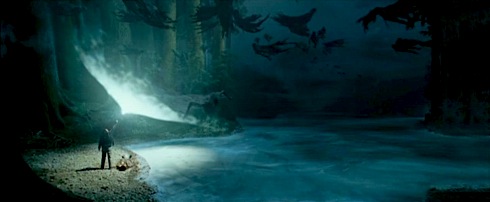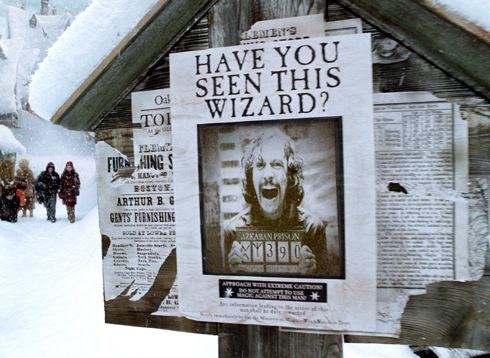To be perfectly honest, the movie I was most worried about rewatching for this series wasn’t Chamber of Secrets, my least favorite one the first time around, it was Prisoner of Azkaban, my runaway favorite. This was the movie that established movie canon as parallel to book canon in the Potterverse, whether for good or bad (I’ve had huge arguments over the significance of the Marauders’ Map’s authorship and even, though this turned out to be a moot point when we saw where J.K. Rowling was going with this in the books, the color of Harry’s oft-remarked-upon eyes). When it came out, I loved it, and ranted to anyone within earshot about how great it was.
A few years later, still only having seen it the once, I got into the Marauder’s Map argument with a huge fan of the book—which I too had read maybe a half-dozen times—and started to wonder: was the movie as good as I’d remembered it? Or was it an adaptation by a filmmaker more concerned with looking cool than staying faithful to the books?
The answers to those questions are a) yes and b) well, kind of. Prisoner of Azkaban is a wildly engaging, suspenseful, extremely well-crafted movie that with the exception of a bit of a pacing hiccup about two-thirds of the way through—which is soon righted—is flawless escapist entertainment. Of all the Harry Potter movies, Prisoner of Azkaban is the most welcoming to non-hardcore devotees, primarily because of the changes (and there aren’t nearly as many as I remembered) are all in the service of making a compelling movie. Alfonso Cuarón’s directorial fluorishes aren’t exactly unobtrusive; a number of them are totally just showing off and the fact that it seems like Harry’s never flown before makes no sense when you stop to think about it. But while the movie’s going on, most of those fluorishes help establish and then deepen the mood and atmosphere.
Prisoner of Azkaban has always been one of my favorite books in the series too. The way J.K. Rowling took a character referenced in passing in in the first book—in the context of being a good enough friend of Hagrid’s that he lent Hagrid his flying motorcycle—and introduced him as a feared villain immediately had me questioning absolutely everything. I thought it was by the far the funniest book, and something about it being the only one in which Voldemort doesn’t appear gives it a lightness even the first two lack. Even little things like it being the only time celebrated Quidditch player Harry Potter wins the Cup were nice.
Of course, there are more important story elements in Prisoner of Azkaban. It introduces Remus Lupin, third Defense Against the Dark Arts teacher in as many years, and the first to not be an evil twit. But, he’s also a werewolf, which complicates things. Cuarón seems particularly fascinated by Lupin’s otherness, telling actor David Thewlis, playing Lupin, that he saw Lupin as gay. This turned out not to be the case in the books, but it’s a provocative allegory, and indicative of the measured irreverence with which Cuarón approached the material.
This results in a movie that, while eliding a number of the details from the book and flat-out omitting others, is coherent enough that it doesn’t require multiple readings of the book to understand. It also, in a nice bonus, clocks in at only a hair over two hours, not counting the truly epic closing credits (which, all kidding aside, are rather nicely animated). The movie loses a lot (if not all) the book’s engaging lightness, which I think is due to the movies being at least three years behind the books, and the influence of the current tone of the books at the time of each movie’s production. Since the first movie didn’t go into production until Goblet of Fire was in bookstores, and Prisoner of Azkaban hit theaters some months after Order of the Phoenix hit shelves, the gradual darkening of the books’ tone impacted the movies’, making Prisoner of Azkaban rather dark indeed and genuinely scary in places.

Prisoner of Azkaban is, by far, the best-acted movie to date in the series. While Dan Radcliffe has a couple clunky moments emotionally—mainly due to his shouting, which is always a little awkward, he’s much better when he chills out a bit—he has many more that are wonderfully candid, as do Emma Watson and Rupert Grint (one thing I didn’t notice until Prisoner of Azkaban: each member of the Weasley family, seemingly, has an accent from a different part of the U.K., which is funny, but I guess redheads don’t grow on trees, and neither do dialect coaches). A lot of this is due to Cuarón having his young actors due actual character work beyond reading the book: the kids all seem like real kids, not just wearing nametags that say “I’m [x] character with [y] characteristics in the book, none of which are on display in [z] movie!”
As for the grown-ups, new arrival David Thewlis does a fine job as Lupin, though I can never shake how different he is than my initial visualization of Lupin (and wishing they’d casted Mark Rylance, but oh well, sands of time). Gary Oldman, though, is absolutely perfect as Sirius Black: every scene of his is a master class in acting. Perhaps the biggest thing that jumped out this rewatch was how much Gary Oldman packs into every single line reading, and how much is conveyed even in the briefest interactions with Radcliffe’s Harry.
The fact that turning the series over to Cuarón led to the lowest-grossing movie in the series (a mere three-quarters of a billion dollars; what a pitiful flop) meant that subsequent entries would feature less wild auteur experimentation. But there will always be Prisoner of Azkaban, bold, independent, irreverent but not disrespectful toward its source material, a very fine movie indeed. Will the next installment, Harry Potter and the Goblet of Fire, continue in a similar vein, or will it, as the producers promised, be a return to greater fidelity to the books? Find out Thursday in the next installment of this rewatch.
Danny Bowes is a playwright, filmmaker and blogger. He is also a contributor to nytheatre.com and Premiere.com.










